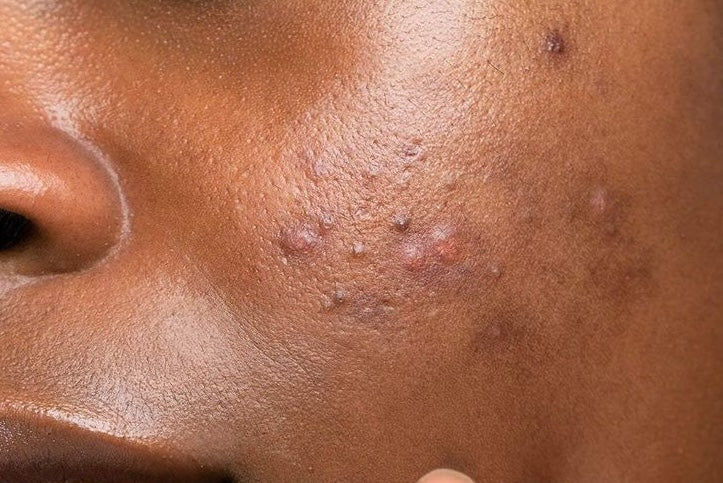Hyperpigmentation is a common concern for individuals with dark, deep, or mixed skin tones. It appears as dark spots on the skin caused by an overproduction of melanin. Understanding its causes and the solutions available is essential to achieving an even, radiant complexion.
What is Melanin and Why is it Important?
Melanin is the natural pigment responsible for the color of your skin, hair, and eyes. It also plays a protective role by absorbing harmful UV rays from the sun. However, excessive melanin production can lead to dark spots, commonly known as hyperpigmentation.
What is Hyperpigmentation?
Hyperpigmentation is characterized by areas of the skin that appear darker than the rest of the complexion due to excess melanin production. It can manifest in various forms, such as freckles, age spots, or larger patches of darkened skin, leading to an uneven skin tone.
Hyperpigmentation in Darker Skin Tones
Black and mixed-race skin contains higher concentrations of melanin, making it more prone to hyperpigmentation. Factors such as acne, scratches, or irritation can trigger an overproduction of melanin, resulting in persistent dark spots. Additionally, these spots tend to take longer to fade due to the dense distribution of melanin in the deeper layers of the skin.
Using overly harsh skincare products or high-concentration active ingredients can weaken the skin barrier and worsen hyperpigmentation. That’s why, at Noire Skincare, we carefully balance our active ingredients to prevent irritation while maintaining the skin’s natural equilibrium.
The Main Types of Hyperpigmentation
-
Post-Inflammatory Hyperpigmentation (PIH): This occurs after skin trauma, such as acne, eczema, or injury. The skin responds by overproducing melanin, leaving behind dark spots once the wound has healed.
-
Hormonal Hyperpigmentation (Melasma): Hormonal fluctuations, particularly during pregnancy or when using hormonal contraceptives, can cause dark patches to appear on the face.
-
Lentigines (Sun Spots): These small dark spots typically develop on sun-exposed areas such as the face and hands due to prolonged UV exposure.
Solutions to Combat Hyperpigmentation
-
Sun Protection: Sun exposure can worsen hyperpigmentation. Daily application of a broad-spectrum sunscreen, even on cloudy days, is essential to prevent new dark spots and protect the skin.
Recommended product:
La Crème Éclat SPF 50 – A hydrating sunscreen that provides optimal UVA/UVB protection. -
Topical Treatments: Ingredients like vitamin C, niacinamide, and retinoids can help fade dark spots and even out the complexion.
Recommended product:
Au Revoir Dark Spots – A powerful serum with tranexamic acid that effectively targets hyperpigmentation. - Gentle Exfoliation: Regular exfoliation removes dead skin cells and promotes cell renewal, helping to fade pigmentation marks.
Recommended products:L’Eau Éclat – A glycolic acid toner that gently exfoliates and brightens dark spots.
Golden Hour – A turmeric and kojic acid soap with natural argan exfoliating grains that refine skin texture while preserving the skin barrier.
-
Avoid Irritation: Refrain from picking or scratching affected areas, as this can worsen pigmentation. Additionally, using gentle, non-irritating products is essential to maintaining the skin’s barrier.
-
Adopt a Balanced Diet: A diet rich in antioxidants and essential nutrients promotes skin health and may help reduce hyperpigmentation.
-
Be Patient: Treating hyperpigmentation takes time and consistency. It’s important to maintain a dedicated skincare routine and have realistic expectations.
-
Consult a Professional: If dark spots persist or worsen, seeking advice from a dermatologist for targeted treatments such as chemical peels, microneedling, or laser therapy may be beneficial.
In Summary
With the right approach and a deeper understanding of your skin’s unique needs, it is possible to reduce hyperpigmentation and achieve a radiant, even complexion. A skincare routine tailored to melanated skin, combined with a balanced diet, can help treat hyperpigmentation and restore your natural glow. Opting for gentle anti-dark spot products with well-balanced active ingredients, incorporating gentle exfoliation, and applying daily sun protection are key steps to treating dark spots without irritating the skin. With patience and consistency, you can unveil a brighter, more even complexion.
Photo Credit: Pinterest
